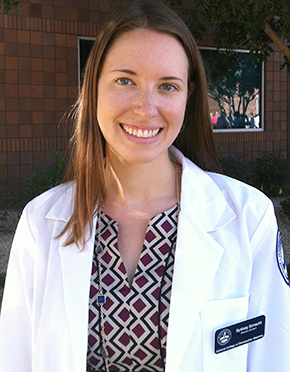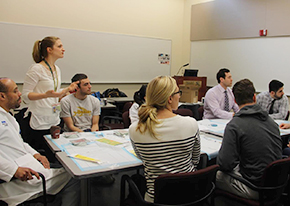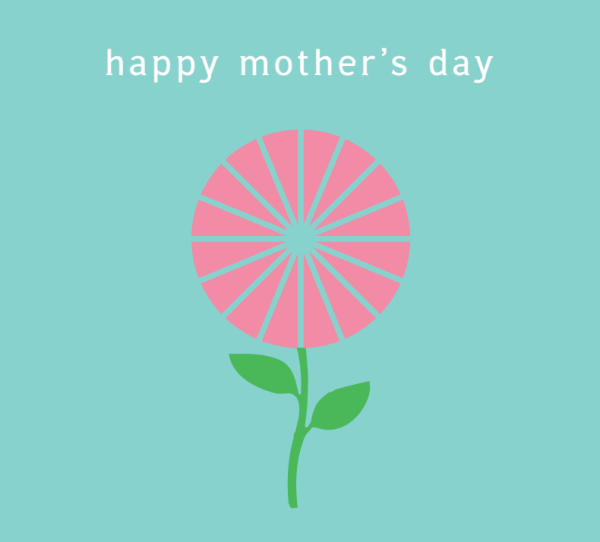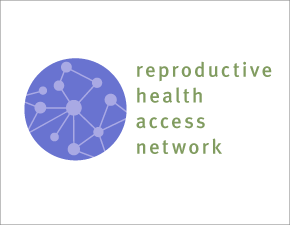Mar 20

You can Support Project Access today!
 Last year the Arizona College of Osteopathic Medicine’s chapter of Medical Students for Choice (MSFC) hosted a bake sale to raise funds to support better training in reproductive healthcare. They decided to donate the $350 they raised to RHAP!
Last year the Arizona College of Osteopathic Medicine’s chapter of Medical Students for Choice (MSFC) hosted a bake sale to raise funds to support better training in reproductive healthcare. They decided to donate the $350 they raised to RHAP!
This spring the students hosted a second bake sale and once again selected RHAP as the beneficiary. Their generosity and dedication to supporting reproductive health access is inspiring. We caught up with the current president of their MSFC chapter, Sydney Schacht, to learn more about the chapter’s great work. Sydney is a second year medical student and joined the group in 2014. When asked why her chapter donated to RHAP she explained, “We love the fact that you provide resources to providers since there are so few avenues for training. We also want to pay it forward in this choice movement – we really feel that without you, we can’t exist, and without us, you can’t. We’re in this together, so it is important to help each other out!”
Sydney has been involved with MSFC for two years. “As a first year they have a club week and you can talk to leadership and I met Hannah Tilden, who was our president last year. She had so much energy and was incredibly passionate.” Sydney explained, “I joined on the spot!”
Arizona has instituted some of the most severe abortion restrictions in the country. This has created a political climate that impacts the medical students. “As far as school, reproductive health care is pretty much not covered. We talked about the pill for 10 minutes. We learned about the IUD but weren’t tested on it. I feel like that is such a huge sign. That it’s not worthy of being examined, that’s the message I took home.” Sydney explained. “We also had a bit of resistance when we showed the documentary After Tiller on campus. There was some Facebook pushback, kind of like ‘don’t ask, don’t tell,’ and that was frustrating because we want to be open about these issues.”
In the face of this resistance, their chapter allows students to come together and find support. “Our faculty advisory is very involved. She teaches a reproductive health elective once a year in the spring quarter.” Sydney says. “Despite limited access to education and training there are these gems that make MSFC a success.”
This year RHAP celebrates ten years of expanding access to abortion, contraception, and miscarriage care throughout the United States. To highlight our growth and accomplishments over those ten years we’ve created the timeline widget below. Click on the arrow to the right the follow the Reproductive Health Access Project’s progress from 2005 to 2015!
 On March 25th, Dr. Erin Hendriks, a Miscarriage Care Initiative (MCI) grantee, hosted an IUD training for medical students in Detroit, MI. Through the MCI program Dr. Hendriks is not only expanding access to miscarriage care but also increasing access to contraception training.
On March 25th, Dr. Erin Hendriks, a Miscarriage Care Initiative (MCI) grantee, hosted an IUD training for medical students in Detroit, MI. Through the MCI program Dr. Hendriks is not only expanding access to miscarriage care but also increasing access to contraception training.
The Miscarriage Care Initiative provided Dr. Hendriks a sophisticated uterine model that she has been using to train faculty, residents and health center staff in miscarriage care. She is also using the model to provide more in-depth training in other uterine procedures, like IUD insertion. This is a great example of RHAP’s overall approach to training. The skills needed to provide different forms of reproductive healthcare often overlap, so exposure to one procedure, such as IUD insertions, may lead a health care provider to want to offer other options, such as contraceptive implants. Just as women have different reproductive health needs over the course of a lifetime, when healthcare providers are exposed to more reproductive health training they often become more invested in providing full-spectrum reproductive healthcare to their patients.
Dr. Hendriks had several residents from her family medicine residency program assist with the IUD workshop. Dr. Jonathan King, a second year resident, showed medical students how to practice inserting IUDs on small plastic models of the uterus. While the medical students will not get hands-on IUD training for a few years, Dr. King is currently learning how to insert IUDs with patients. “It’s been going well, I’m feeling more confident,” he explained. Dr. King said he enjoys being able to expand his reproductive health skills during residency and hopes to continue providing IUDs after graduation.
 Mother’s Day is this Sunday, May 10, 2015. Donate $25 or more to RHAP by the end of today, May 6, and we will send a Mother’s Day card to a special person in your life. Your gift will help train and support clinicians to provide compassionate, comprehensive reproductive health care. E-cards are also available upon request.
Mother’s Day is this Sunday, May 10, 2015. Donate $25 or more to RHAP by the end of today, May 6, and we will send a Mother’s Day card to a special person in your life. Your gift will help train and support clinicians to provide compassionate, comprehensive reproductive health care. E-cards are also available upon request.
Women’s reproductive health needs change throughout their lives. Receiving care from a primary care clinician who knows you best can make all the difference. From finding the form of contraception that works best for you to managing a miscarriage with a healthcare provider you trust, RHAP believes that these critical services should be easily accessible.
Make your gift of $25 or more today. By making a contribution to RHAP you are celebrating a special person in your life and improving access to abortion, contraception, and miscarriage care across the United States.
 April proved to be a very busy month for the Reproductive Health Access Network! Both the New Jersey and Philadelphia Clusters met, bringing together local family physicians, residents, and advanced practice clinicians. RHAP also hosted the first two national Network meetings of 2015, and we were so happy to see both new and familiar faces in attendance. These gatherings always serve as a powerful reminder of the importance of pro-choice clinicians uniting to discuss barriers, share ideas, and celebrate our work, particularly in the face of growing challenges across the country.
April proved to be a very busy month for the Reproductive Health Access Network! Both the New Jersey and Philadelphia Clusters met, bringing together local family physicians, residents, and advanced practice clinicians. RHAP also hosted the first two national Network meetings of 2015, and we were so happy to see both new and familiar faces in attendance. These gatherings always serve as a powerful reminder of the importance of pro-choice clinicians uniting to discuss barriers, share ideas, and celebrate our work, particularly in the face of growing challenges across the country.
In other news, we are pleased to share with you the creation of our “Network Allies” group. Network Allies are reproductive healthcare professionals who work closely with clinicians to address barriers to expanding care through advocacy, organizing, and activism. As an Ally, you will receive the Network newsletter, information about advocacy opportunities, and updates on Network events. If you are interested in becoming a Network Ally, please e-mail network@reproductiveaccess.org with your name, occupation, and organization. We look forward to speaking with you about the work that you do.
Subscribe to receive monthly updates from the Reproductive Health Access Project.
Your gift allows us to train and support health care providers across the United States so they can offer patients compassionate and comprehensive care.
Mar 20
